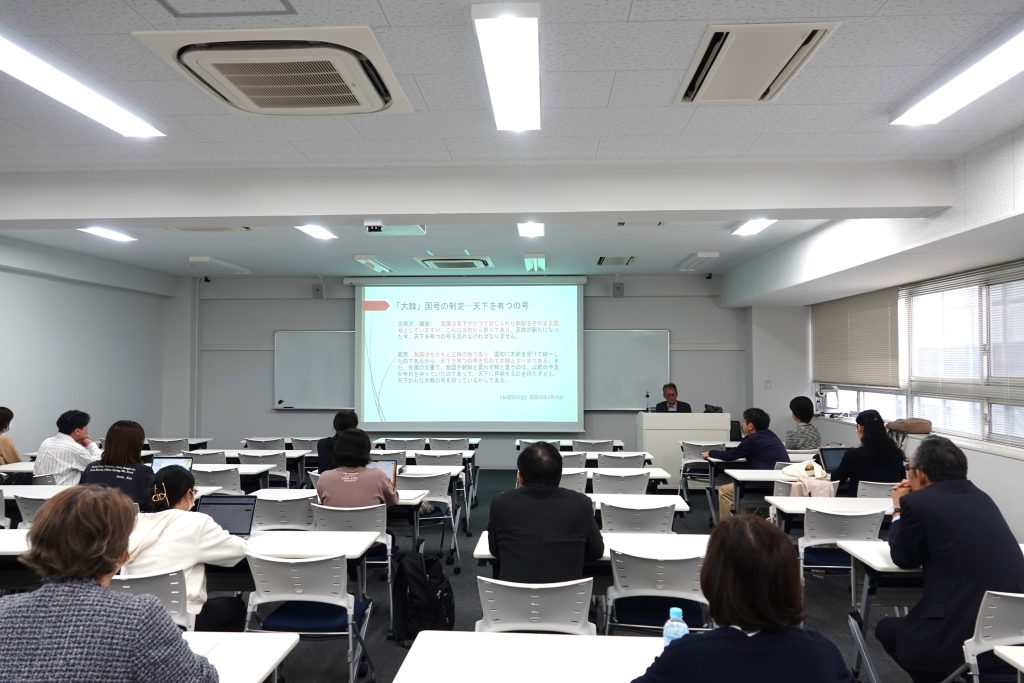On October 31, 2024, the 3rd EALAI project seminar was held with a lecture titled “Revisit of Korean Empire – Focusing on the Korean Consciousness of Little China (Sojunghwa)-” by Prof. Tatsuhiko Tsukiashi (Graduate School of Arts and Sciences).
In 1897, the Korean Empire was founded with the enthronement of Goj Jong, which was then annexed by Japan in 1910. Prof. Tsukiashi delivered a lecture on new findings about how and why it was founded, referring to the latest works.
When the empire was built, it was emphasized that Korea was a legitimate heir of China. There were petitions to the emperor which said, “Ceremony and Music are here in our country, which have been inherited as a legitimate successor from Fuxi and the Yellow Emperor for about 5000 years.” As this demonstrates, “the Consciousness of Little China (Sojunghwa)”, which was the belief that Korea was a legitimate successor to China, was reflected in the enthronement of Gojong.
Gojong introduced a new era name and held the ceremony of the enthronement at the Hwangudan-alter, following the tradition of the Ming dynasty. Since around 1700, Korea had performed the ritual of the Daebodan (The Altar of Great Gratitude) in remembrance of the Wanli Emperor and the Chongzhen Emperor, both in the Ming dynasty, in reciprocation for the dynasty’s assistance which had defended Korea from Japan’s invasions. Besides, in this ceremony, Gojong intended to revive the “ruined” “imperial line” of the dynasty. He named the empire the Korean Empire after ancient Korea, mentioning that it originated in the unification of the three ancient Korean dynasties.
The Korean Empire was founded as a “Little China” Empire, however, afterwords, Gojong tried to “civilize” the image of the empire, by the ways such as wearing a European military uniform. “Further research is needed on this subject,” Prof. Tsukiashi said.

This seminar had a large audience, a variety of questions and vivid discussions. Prof. Tsukiashi examined the Korean Empire thoroughly from the point of view of Gojong or Korea, based on the history of Korea. This approach is incompatible with Orientalism or Anachronism.
The founding of the Korean empire was deeply affected by the Ming dynasty, however, in general, it has been recognized as independence from the Qing dynasty which had been a suzerain state of Korea. Nevertheless, there may be a possibility to interpret the “declaration of independence” as a declaration of joint struggle with the Qing dynasty when we find a statement in one of the petitions to the emperor which said, “Because the Wanli Emperor had blessedly reconstructed our land while facing the Japanese invasions of Korea, we are loyal as a vassal and grateful as a child to the Ming dynasty.” It seems to emphasize the dynasty’s repelling of Japan. Consequently, it seems to me that Gojong tried to waken the Qing dynasty which had been defeated by Japan in the Sino-Japanese war, to once again fight off Japan which appeared to intend to invade China. Gojong’s speculation of the Qing dynasty should be in the vast petitions to the emperor submitted during the founding of the Korean Empire. The relationship Between the Empire and the Dynasty may be more complicated.

Report by TAKAYAMA Shokei (Former EAA Youth)





